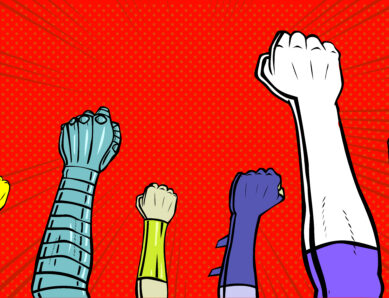Is it a bird? Is it a plane? No, it’s a series of leadership lessons from famous superheroes!
For the past 15 years, superheroes have saturated our screens. Starting with Iron Man in 2008, Marvel began its mission to dominate the global box office with a series of interconnected superhero movies. And it succeeded beyond all expectations. The latest movie, The Marvels, is their 33rd superhero film in what’s called the Marvel Cinematic Universe (MCU).
But superheroes have held audiences captivated for a lot longer than that. The first Superman comic book was published in 1938, followed by Batman just a year later. Audiences have been ready for the MCU for nearly 100 years. But why do we love them so much? And what lessons can they teach us?
The Super Team
Superheroes look like us but they’re better – stronger, faster, smarter, luckier, and they look good in spandex. Despite their extra powers, they still fight against insurmountable odds, battling equally strong intergalactic baddies hell-bent on humanity’s destruction.
Superheroes offer a sense of hope and inspiration. They’re something to look up to when things seem overwhelming. They take on the impossible and win. And, increasingly, they do it as a team. Egos may clash and tempers fray, but, on many an occasion, they win because they work together.
Leadership Lessons From Superheroes
It’s not easy to do, but when you’re a leader of an organization or team, there are many crucial behaviors you need to embody to succeed. Good leadership is about so much more than telling people what to do – and superheroes demonstrate some of the most important of these leadership qualities.
Here is a selection of some classic superheroes, and what they can teach us about how to be a good leader.
Spiderman: Responsibility

Sure, Spiderman climbs walls and swings between skyscrapers, but his central guiding principle is one we can all adopt – responsibility.
When New York teenager Peter Parker gets bitten by a radioactive spider he becomes Spiderman. He uses his newfound powers to fight crime for the good of the city residents. His deep sense of commitment to helping others is summed up in his calling card, “your friendly neighborhood Spiderman!” He’s here to serve, to do good for his community.
But the most famous of Spiderman’s lines was coined in a 1962 comic: “with great power comes great responsibility.” Dubbed “the Peter Parker Principle,” this concept has been alive since the time of the ancient Greeks – but it took a comic book to best formulate the maxim.
Leadership lesson: The possession of power brings with it a moral imperative to do good by others. A good leader knows this and they live the Peter Parker Principle in everything they do.
Batman: Resourcefulness and Planning

The most famous superhero with no actual superpowers, Batman is a brooding loner who moves in the shadows. Not the ideal leader, you might think. But what Batman lacks in people skills and power, he makes up for with “smarts”: he always has a plan, he’s ready for anything, and he can adapt.
He keeps the criminals and supervillains of Gotham in check through tactical planning and a clever allocation and deployment of his resources. He doesn’t need superpowers to lead and succeed.
Leadership lesson: Leadership is about being ready for anything. Pragmatism in the face of change and a keen eye for spotting what’s around the corner mean that a leader won’t be caught by surprise. In a fast-changing, unstable world, having plans and procedures in place for when things go wrong is often crucial to the success of a project, and the health of a whole organization.
The Hulk: Keeping Your Cool

You won’t like him when he’s angry. I’m not talking about your ex-boss but Bruce Banner, aka the Hulk.
One fateful day, Banner accidentally absorbed unhealthy levels of gamma rays, and now whenever he gets mad he becomes the Hulk – a giant green mass of rage. But, in the most recent movies, the Hulk learns to control his anger and channel it for good.
Leadership lesson: As a leader, it’s no use exploding at everything and anyone around you when things don’t go your way. Yes, you might get angry sometimes. But learning to accept and deal with it is a crucial skill for leaders. By default of your position, your team will look to you for guidance and see you as an example. You need to adopt the behaviors you want to see in them.
Black Panther: Protecting Your People

Like his father before him, T’Challa takes up the mantle of Black Panther – the protector of Wakanda, a super technologically advanced African nation.
With vast reserves of the precious resource vibranium, Wakanda has remained secretive to avoid the interest of greedy outsiders. Black Panther uses his significant abilities to keep his people safe, fighting invaders as well as dealing with internal instability. T’Challa fights for his people and never gives up on them.
Leadership lesson: A leader is a leader by virtue of the people they lead. Good leaders know that, and they know they are there to protect and serve. When people feel like a leader has their back, their confidence will increase and they’re more likely to do their best work – and they won’t be looking at the door for a better opportunity elsewhere.
The Fantastic Four: Embracing Teamwork
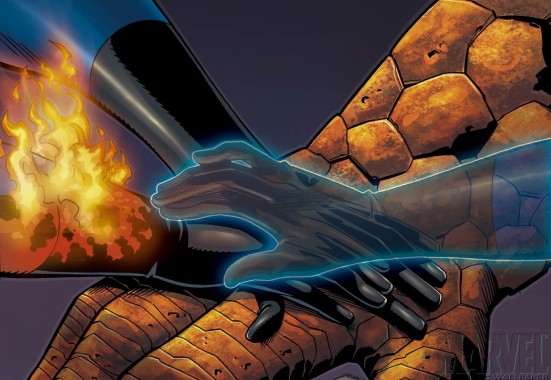
Before the Avengers, before Guardians of the Galaxy, there were The Fantastic Four – the first ever superhero family unit.
After an unfortunate overexposure of cosmic rays, four scientist friends get transformed into superheroes, each with a unique ability. While Mister Fantastic started out as the clear leader in the comic books, over time the hierarchy gave way to a more collaborative approach to saving the world. The team became very much that – a team.
Leadership lesson: A good leader works collaboratively. They recognize the value of teamwork. It’s a cliché, but a team is greater than the sum of its parts, and a project is better served by a fully functioning team than a series of individuals working in isolation.
Professor X: Delegation
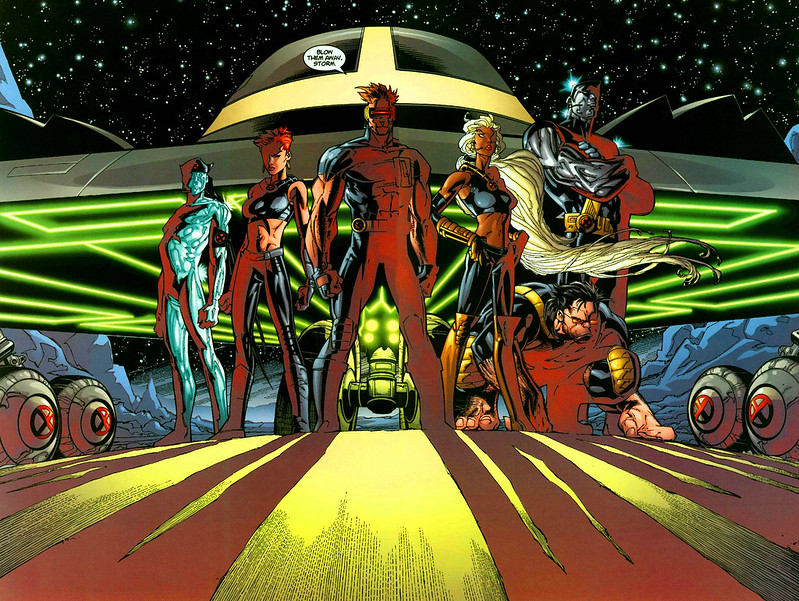
In the world of X-Men, some people are born with a “mutant” genome. Considered different from regular folk, mutants have a tricky time fitting in to regular society. Professor Xavier does his best to help, including establishing the X-Men – a team of mutants who fight evil and the fallout of mutant prejudice.
Professor X is the leader of the X-Men, but he lets the rest of the team get on with the real work. He’s gathered the best people together, given them a clear mission, and then stepped aside to let them do their thing.
Leadership lesson: Leaders know when to take a step back. It can be one of the hardest things to do, especially when a project, team, or even whole company is your brainchild. But there comes a time when you have to let go. Empower your team and you’ll be surprised at what they can achieve.
(If you’re struggling with this, you might be facing an “autonomy” crisis as your organization grows. This is a normal stage in the evolution of a growing company. See our article on the Greiner Curve to learn about phases of growth an organization goes through.)
Bonus Superhero Leadership Lessons
Even the more questionable type of super folk have lessons to offer. Here are two.
Deadpool: Have Fun
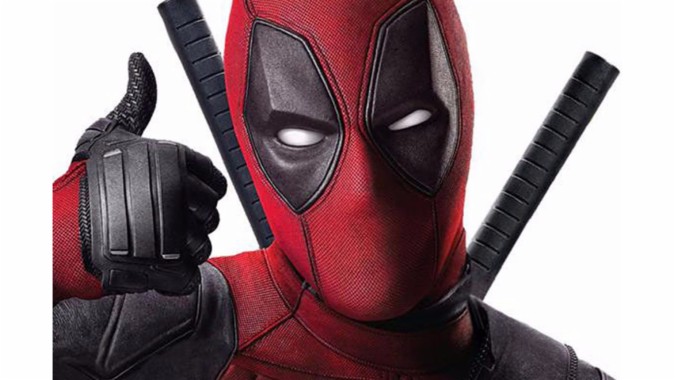
Brought to life on the big screen by actor Ryan Reynolds, the “Merc [mercenary] With a Mouth” has become a fan favourite in recent years for his irreverent yet loving send-up of the superhero genre. With a never-ending arsenal of witty one-liners, Deadpool wastes no time in upending and deriding the tropes of superhero stories. He doesn’t so much nod to the camera as reach through it and slap you in the face.
Leadership lesson: Don’t take everything too seriously. This is work. Yes, you’re responsible for people and budgets and bottom lines, but it’s still work. You don’t want to be an energy drainer, either. If people are relaxed and happy, they’ll perform better. Let them take their cue from you.
Thanos: Be Realistic
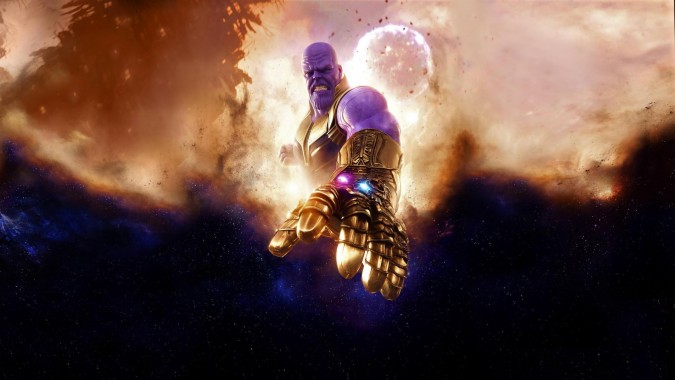
A few too many Marvel fans seemed to think that Thanos – the giant purple supervillain alien – was on to something when he planned to wipe out half of all living things in the universe in the Marvel Avengers films.
Perhaps he was motivated by a certain kind of misplaced care, but, luckily, the Marvel Avengers recognized it was a somewhat flawed approach and found a way to undo it and save the universe.
Leadership lesson: Don’t be a Thanos. When you’ve got a goal and you’ve put time, resources and energy into executing it, it can be hard to admit when it’s not going well. Never be afraid to change your plans when things go wrong or to adapt when things change. People will respect you for it.
Be a Superhero Leader
Leadership isn’t about being the best in the room. Leadership is about getting the best from others. Good leaders know that their role is to make other people shine. They show the way by setting the tone and engendering a positive culture within a team.
If you do that, you’ll be a real superhero in your organization.
Useful Resources on Leadership
Here is a selection of resources on leadership from Mind Tools. (Please note, for some resources you may need to be a Mind Tools member to gain access.)
How Good Are Your Leadership Skills? (Quiz)
Marvel’s Legendary Turnaround (Case Study)
Leadership Styles (Article)
What Is Leadership? (Article)
What a Real Leader Knows (Article)
Leading by Example (Article)
Empowerment and Delegation (Skillbook)
Forming, Storming, Norming, and Performing (Article)
French and Raven’s Five Forms of Power (Article)
Ethical Leadership (Article)
About the Author:
 Matthew has 10 years of experience writing, editing and commissioning online content. As a content editor, he’s worked in several industries – including charity, culture and travel – before finding his calling in L&D at Mind Tools, where he creates accessible, timely and engaging content for learners.
Matthew has 10 years of experience writing, editing and commissioning online content. As a content editor, he’s worked in several industries – including charity, culture and travel – before finding his calling in L&D at Mind Tools, where he creates accessible, timely and engaging content for learners.